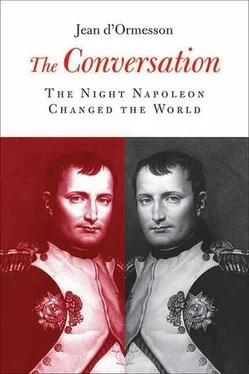CAMBACÉRÈS
I’m not accustomed to hearing you sound so uncertain.
BONAPARTE
It is the nations around us that feel uncertain. They are hesitating about allying themselves more closely with me. I sense their reticence. They don’t know what dance-step to take with our odd form of governance.
CAMBACÉRÈS
Truly?
BONAPARTE
Truly. The ambiguities of the Consulate give them pause.
CAMBACÉRÈS
Nonetheless they have no choice but to attest to the order and security that now reign in our country. How different from how things were four years ago, on the eve of Eighteen Brumaire!
BONAPARTE
It was anarchy. Twenty-thousand criminals immersed Paris in fire and blood. And forty thousand Royalist Chouans were in control of the country in the West and intercepting communications between Paris and the sea.
CAMBACÉRÈS
Admiral Bruix told me at the time that it took him a month to reach Brest to take up his command.
BONAPARTE
In thirty of the country’s departments, the Chouannerie was little more than a pretext for thievery. The right bank of the Garonne, Provence, the Languedoc, and the entire Rhone Valley was in the hands of highwaymen. Coaches were attacked, couriers robbed, homes looted. Pillagers were putting peasants’ feet on red-hot grills to make them tell them where their money was stashed.
CAMBACÉRÈS
I know several merchants, even two representatives on official business, who bought passports from these bands just to ensure safe passage from Paris to Marseille or to Aix-en Provence. No one went anywhere without an armed escort.
BONAPARTE
The roads were impassable, public buildings were in shambles. It took Marseilles a full year to do the business it used to do in six months, and its old port was a wreck. In Lyon, there were fifteen-hundred boats instead of the normal eight thousand. In Paris, workshops hired a fraction as many workers as in 1789. It is indisputable that because of me, the present is better than the past. The future is what preoccupies me now.
CAMBACÉRÈS
You have secured the future because you have done away with the past.
BONAPARTE
Do not deceive yourself. I am at one with all of France’s past, from Clovis to this National Convention — of which you were also a part, my dear Cambacérès — and several times have I saved it from foreign threat. I have fought against, and beaten, violence, hatred, excesses, divisions, factions. No more factions. I want them gone.
CAMBACÉRÈS
You have planted the colors, starting the day after Eighteen Brumaire and right up to your arrival here in the Tuileries. You have put your wife in Marie-Antoinette’s bedroom, and you have taken as your bedroom that of Louis the Sixteenth. Yet I understand that you find this a somewhat sad place.
BONAPARTE
Grandeur is always sad.
CAMBACÉRÈS
You found its walls covered in revolutionary graffiti and festooned in decorations dominated by the red cap. You called it “filth” and ordered that it be removed.
BONAPARTE
Enough of the red heel and the red cap! Enough of Jacobins and the Royalists. I recognize no more parties and I see in France only the French. I have had enough of people taking sides. I am on the side of the French people, and I leave nothing to chance — neither the great issues nor the smallest details. I have taken the place of the Bourbons and now embody a sovereign people. I restore order to things, but I do not restore them for others. I restore them for myself. You remember, Cambacérès, the Constitution that Sieyès wanted to fob off on us after Eighteen Brumaire?
CAMBACÉRÈS
Very clearly. At the top of the hierarchy would be the Grand Elector, a king without royal command, installed in Versailles, who would choose two consuls, one to manage exterior matters — the army, the navy, the colonies, war. The other would manage interior matters, meaning the police, justice, finance. Below them were the ministers, the procurators of public service. At their side was a College of Conservators, who would have designated a tribunal, charged with debating matters of law, as well as a legislative body that would have voted upon them.
BONAPARTE
Perhaps you also remember that you were in favor of all that metaphysical nonsense.
CAMBACÉRÈS
In favor? Permit me to say that that’s simplifying it a little. I didn’t hesitate to abandon the spirit of the assembly for the spirit of government and choose you over that metaphysical nonsense, as you put it.
BONAPARTE
As for me, I would have rather have been up to my knees in blood than see all that become reality. When Sieyès proposed that I move into Versailles and assume the ridiculous title of Grand Elector, which translated as “weak-kneed king,” I replied, “How is it, Citizen Sieyès, that you believe that a man of honor would agree to be a pig in the manure inside Versailles?”
CAMBACÉRÈS
That shook everyone up. You rid yourself of Sieyès and of Barras, who seemed all-powerful, and you recruited me, who gave myself to you.
BONAPARTE
I like you, Cambacérès. That’s the reason you are Second Consul. You are wise, pragmatic, and prudent. Perhaps too pragmatic and too prudent. Above all you are an excellent administrator. Military men are excellent at slashing and burning. Administrators determine the success of an enterprise.
CAMBACÉRÈS
I owe you everything. I serve you scrupulously and loyally.
BONAPARTE
You have never disappointed me. So now I will match your loyalty and speak to you with an open heart. In addition to your appetite for food, you have another small fault that would cost you more with someone other than me.
CAMBACÉRÈS
Another small fault?
BONAPARTE
Don’t play dumb, Cambacérès. Not only are you not married. .
CAMBACÉRÈS
You would wish that I were?
BONAPARTE
If it meant being marrying some silly goose like that imbecile Talleyrand has done, assuredly not. But let us look straight at the matter: you don’t like women. The other day when you arrived late to the Counsel of State and kept me waiting, you offered the excuse that a woman had made you late. I put you on notice. “Next time, you will tell this woman to take her cane and hat and be gone.”
CAMBACÉRÈS
Citizen First Consul, no scandal has ever besmirched my private life, and public order was never disturbed on my account. I have never compromised my dignity and most certainly not yours.
BONAPARTE
That is not important. You have been cautious. Your prudence has nonetheless not prevented Talleyrand from grouping all of us consuls in a formula which he amuses Paris by calling, “Hic, Haec, Hoc.”
CAMBACÉRÈS
Monsieur de Talleyrand is perhaps recalling his Church Latin.
BONAPARTE
Hic is the masculine demonstrative and has a certain emphasis. That’s me. Haec , the feminine demonstrative, is vaguely pejorative in tone. That’s you. Hoc , the neutral demonstrative, which is completely insulting, is poor Lebrun. I say this in the spirit of friendship, Cambacérès. Don’t be too Haec .
CAMBACÉRÈS
General, I will speak with the same frankness with which you are showing me. When I was young I visited the girls just as all the boys did, but I took no great pleasure there and never stayed for long. As soon as I was finished, I said, “Adieu, messieurs!” and left.
Читать дальше












